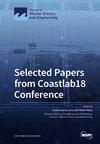Regional Sea Level Changes in the East China Sea from 1993 to 2020 Based on Satellite Altimetry
IF 2.8
3区 地球科学
Q1 ENGINEERING, MARINE
引用次数: 0
Abstract
A comprehensive analysis was carried out to investigate the driving factors and influencing mechanisms of spatiotemporal variation of sea level at multiple scales in the East China Sea (ECS) via satellite altimetry datasets from 1993 to 2020. Based on the altimetry grid data processed by the local mean decomposition method, the spatiotemporal changes of ECS sea level are analyzed from the multi-scale perspective in terms of multi-year, seasonal, interannual, and multi-modal scales. The results revealed that the ECS regional mean sea level change rate is 3.41 ± 0.58 mm/year over the 28-year period. On the seasonal scale, the regional mean sea level change rates are 3.45 ± 0.66 mm/year, 3.35 ± 0.60 mm/year, 3.39 ± 0.71 mm/year, and 3.57 ± 0.75 mm/year, for the four seasons (i.e., spring, summer, autumn, and winter) respectively. The spatial distribution analysis showed that ECS sea level changes are most pronounced in coastal areas. The northeast sea area of Taiwan and the edge of the East China Sea shelf are important areas of mesoscale eddy activity, which have an important impact on regional sea level change. The ECS seasonal sea level change is mainly affected by monsoons, precipitation, and temperature changes. The spatial distribution analysis indicated that the impact factors, including seawater thermal expansion, monsoons, ENSO, and the Kuroshio Current, dominated the ECS seasonal sea level change. Additionally, the ENSO and Kuroshio Current collectively affect the spatial distribution characteristics. Additionally, the empirical orthogonal function was employed to analyze the three modes of ECS regional sea level change, with the first three modes contributing 26.37%, 12.32%, and 10.47%, respectively. Spatially, the first mode mainly corresponds to ENSO index, whereas the second and third modes are linked to seasonal factors, and exhibit antiphase effects. The analyzed correlations between the ECS sea level change and southern oscillation index (SOI), revealed the consistent spatial characteristics between the regions affected by ENSO and those by the Kuroshio Current.基于卫星高度测量的 1993-2020 年东海区域海平面变化
通过1993-2020年卫星测高数据集,对东海海平面多尺度时空变化的驱动因素和影响机制进行了综合分析。基于局部均值分解法处理的测高网格数据,从多年尺度、季节尺度、年际尺度和多模式尺度等多尺度角度分析了东海海平面的时空变化。结果表明,28 年间 ECS 区域平均海平面变化率为 3.41 ± 0.58 毫米/年。在季节尺度上,四季(春、夏、秋、冬)的区域平均海平面变化率分别为 3.45 ± 0.66 毫米/年、3.35 ± 0.60 毫米/年、3.39 ± 0.71 毫米/年和 3.57 ± 0.75 毫米/年。空间分布分析表明,ECS 海平面变化在沿海地区最为明显。台湾东北海域和东海大陆架边缘是中尺度涡活动的重要区域,对区域海平面变化有重要影响。东海大陆架季节海平面变化主要受季风、降水和温度变化的影响。空间分布分析表明,海水热膨胀、季风、厄尔尼诺/南方涛动和黑潮等影响因素对 ECS 季节海平面变化起主导作用。此外,厄尔尼诺/南方涛动和黑潮共同影响了空间分布特征。此外,利用经验正交函数分析了 ECS 区域海平面变化的三种模式,前三种模式的贡献率分别为 26.37%、12.32% 和 10.47%。从空间上看,第一种模式主要与厄尔尼诺/南方涛动指数相对应,而第二和第三种模式则与季节因素相关,并表现出反相位效应。通过分析 ECS 海平面变化与南方涛动指数(SOI)之间的相关性,发现受厄尔尼诺/南方涛动影响的区域与受黑潮影响的区域具有一致的空间特征。
本文章由计算机程序翻译,如有差异,请以英文原文为准。
求助全文
约1分钟内获得全文
求助全文
来源期刊

Journal of Marine Science and Engineering
Engineering-Ocean Engineering
CiteScore
4.40
自引率
20.70%
发文量
1640
审稿时长
18.09 days
期刊介绍:
Journal of Marine Science and Engineering (JMSE; ISSN 2077-1312) is an international, peer-reviewed open access journal which provides an advanced forum for studies related to marine science and engineering. It publishes reviews, research papers and communications. Our aim is to encourage scientists to publish their experimental and theoretical results in as much detail as possible. There is no restriction on the length of the papers. The full experimental details must be provided so that the results can be reproduced. Electronic files and software regarding the full details of the calculation or experimental procedure, if unable to be published in a normal way, can be deposited as supplementary electronic material.
 求助内容:
求助内容: 应助结果提醒方式:
应助结果提醒方式:


